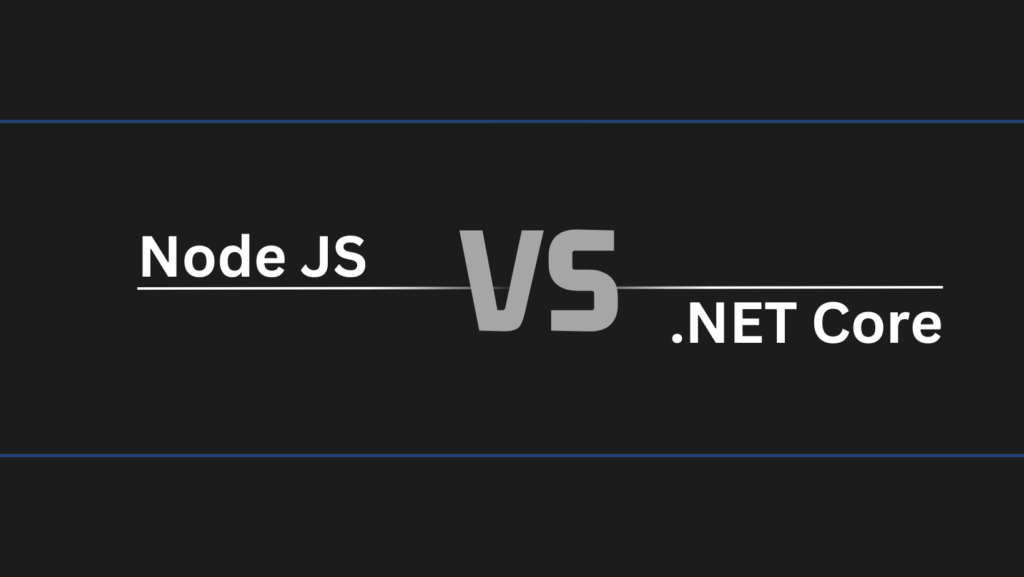When it comes to choosing a backend technology for your project, it can be difficult to decide between the many different options available. Two of the most popular choices are Node.js and .NET Core, both of which have their own unique strengths and weaknesses. In this article, we will take a closer look at these two technologies and compare them in terms of language, performance, ecosystem, and use cases, to help you decide which one is the best fit for your project. Whether you are building a real-time, data-intensive application or a more general-purpose web, mobile, or desktop app, this comparison will give you the information you need to make an informed decision.
What is Node.js?
Node.js is an open-source JavaScript runtime environment that is designed for building scalable network applications. It is built on top of the Chrome V8 JavaScript engine and uses an event-driven, non-blocking I/O model, which makes it lightweight and efficient. Node.js is popular for building real-time, data-intensive applications and is often used for building web servers, chat applications, and other types of networked software.
What is .NET Core?
.NET Core is a cross-platform, open-source version of the .NET framework that is designed for building modern applications. It is a powerful and flexible platform that supports a wide range of programming languages, including C#, F#, and VB.NET. .NET Core is suitable for building a wide range of applications, including web, mobile, and desktop applications, as well as microservices and cloud-based applications.
So, which one should you choose for your backend development project?
Here are a few things to consider:
Language: If you are comfortable with JavaScript and are looking for a backend technology that uses the same language as your front end, then Node.js might be the better choice. On the other hand, if you prefer to work with a different language, such as C# or F#, then .NET Core might be a better fit.
Performance: Node.js is generally considered to be more lightweight and efficient than .NET Core, due to its non-blocking I/O model. However, .NET Core has improved significantly in recent years and is now quite performant, especially when used with the right runtime and workload. Ultimately, the performance of your application will depend on how you use the technology and how well you optimize your code.
Ecosystem: Both Node.js and .NET Core have large and active developer communities, which means there is a wealth of resources and tools available for each platform. Node.js has a larger ecosystem of open-source packages and libraries, which can make it easier to find and integrate with the tools you need. .NET Core, on the other hand, has a more structured and formalized ecosystem, which can make it easier to find support and guidance from Microsoft and the .NET community.
Scalability: Node.js and .NET Core are designed for building scalable applications, but they approach scalability in different ways. Node.js is known for its ability to handle a large number of concurrent connections with minimal overhead, making it well-suited to real-time, high-concurrency applications. .NET Core, on the other hand, is designed to scale vertically by using more powerful hardware and can also scale horizontally by running multiple instances of the application.
Legacy support: If you are working on a legacy application that was built using the full .NET framework, you might want to consider using .NET Core to modernize and update the application. .NET Core is a cross-platform, open-source version of the .NET framework that is designed to be more flexible and modular than the full framework.
Integration with other technologies: If you are integrating your backend application with other systems or technologies, you might want to consider how well each technology integrates with those systems. Both Node.js and .NET Core have strong support for integration with a variety of databases and other technologies, but one might be better suited to your specific needs.
Deployment: Node.js and .NET Core can be deployed to a variety of platforms and environments, but they might have different requirements and considerations. For example, Node.js is often deployed to cloud environments like AWS, Azure, or Google Cloud, while .NET Core can be deployed to these environments as well as on-premises servers.
Community support: Node.js and .NET Core have large and active developer communities, which means there is a wealth of resources and support available for each technology. However, the size and nature of these communities might differ, and one technology might have more support for your specific needs.
Cost: The cost of using Node.js or .NET Core for your backend development project will depend on a variety of factors, including the size and complexity of your project, the tools and resources you need, and the hosting and deployment costs. In general, both technologies have a variety of free and open-source resources available, but you might incur costs for proprietary tools or services.
Future-proofing: When choosing a backend technology, you might want to consider how well the technology is likely to stand the test of time. Both Node.js and .NET Core are widely used and supported technologies, but one might be more likely to continue to be supported and evolve in the future.
Compatibility with frontend technologies: If you are building a full-stack application, you might want to consider how well the backend technology you choose integrates with the frontend technology you are using. Both Node.js and .NET Core can be used with a variety of front-end technologies, but one might be a better fit for your specific needs.
Development speed: The development speed of your project will depend on a variety of factors, including the complexity of your project, the skills of your team, and the tools and resources you are using. Both Node.js and .NET Core are powerful and flexible technologies that can enable rapid development, but one might be better suited to your specific needs.
Testing and debugging: Node.js and .NET Core have a variety of tools and resources available for testing and debugging your application. However, the specific tools and approaches you will use will depend on the technology you choose. For example, Node.js has a large ecosystem of testing frameworks and libraries, while .NET Core has built-in support for testing and debugging with Visual Studio.
Concurrency: Both Node.js and .NET Core are designed to handle concurrent requests, but they approach concurrency in different ways. Node.js uses a non-blocking, event-driven model, while .NET Core uses a thread-based model. The specific concurrency model you choose will depend on your specific needs and the type of application you are building.
Security: Security is an important consideration when choosing a backend technology, and both Node.js and .NET Core have strong support for security features. However, the specific security features and approaches you will use will depend on the technology you choose. For example, .NET Core has built-in support for authentication and authorization, while Node.js has a variety of open-source libraries available for these purposes.
Use cases: Node.js and .NET Core are suitable for building a wide range of applications, but they may be better suited to different types of projects. Node.js is particularly well-suited to building real-time, data-intensive applications, such as web servers and chat apps. .NET Core, on the other hand, is a more general-purpose platform that is suitable for building a wide range of applications, including web, mobile, and desktop apps, as well as microservices and cloud-based applications.
Conclusion
In conclusion, whether you choose Node.js or .NET Core for your backend development project will depend on your specific needs and requirements. Both technologies have their own strengths and weaknesses, and the one that is best for your project will depend on your goals, language preferences, performance needs, hiring a Node/.net core developer, and the type of application you are building.
Suggested:
Node.js Vs Golang: Which One To Choose? An In-Depth Comparison.
Reasons To Choose Node Js For Web App Development.






 Is Dynamics 365 sales a model-driven app?
Is Dynamics 365 sales a model-driven app?